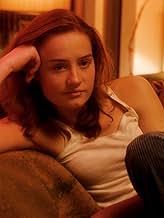Johanne veliebt sich in ihre Lehrerin und hält ihre Fantasien und Gefühle schriftlich fest. Zusammen mit ihrer Mutter und Großmutter debattieren sie über das literarische Potenzial und ob si... Alles lesenJohanne veliebt sich in ihre Lehrerin und hält ihre Fantasien und Gefühle schriftlich fest. Zusammen mit ihrer Mutter und Großmutter debattieren sie über das literarische Potenzial und ob sie es veröffentlichen sollten.Johanne veliebt sich in ihre Lehrerin und hält ihre Fantasien und Gefühle schriftlich fest. Zusammen mit ihrer Mutter und Großmutter debattieren sie über das literarische Potenzial und ob sie es veröffentlichen sollten.
- Regie
- Drehbuch
- Hauptbesetzung
- Auszeichnungen
- 3 Gewinne & 1 Nominierung insgesamt
Empfohlene Bewertungen
Drømmer was meant to be a meditative exploration of first love, memory, and the power of personal narrative-a film that should have delved into the delicate interplay between lived experience and its preservation in words. In theory, director Dag Johan Haugerud's ambitious final installment in his "Sex, Dreams, and Love" trilogy promised a rich, introspective journey through the tumultuous inner life of Johanne (Ella Øverbye), as she navigated an obsessive crush on her teacher (Selome Emnetu) and documented her emotional odyssey in a diary meant to capture a fleeting moment of passion.
In practice, however, Drømmer is not really a movie. What we saw on screen wasn't a cinematic experience at all-it was a monotonous literature reading with moving pictures on screen. There's virtually no sense of true cinematography here: the supposed visual aesthetics are non-existent, the actors deliver their lines without any palpable emotion, and any hint of live, resonant performance is completely absent. Instead of being enveloped in a tapestry of carefully crafted images and nuanced performances, the audience is subjected to a sterile recitation of words that feel more like a tired reading session than a film.
The film's thematic ambitions-to explore the inner conflicts of first love, the tension between reality and its written representation, and the complex dynamics within a family grappling with unspoken truths-are entirely undermined by its flat, lifeless presentation. What should have been a profound journey into the depths of youthful longing and introspection is reduced to a tedious string of narrative passages, devoid of the emotional and visual dynamism one expects from cinema.
In essence, while Drømmer aimed to be a reflective, even transformative, look at the nature of memory and desire, it ultimately fails to transcend the medium of a monotonous recitation. Rather than engaging us with its supposed exploration of inner truth, it leaves us frustrated and disconnected-a missed opportunity where the lofty ideas remain locked behind a facade of lifeless words and uninspired visuals.
This award is a disgrace to Berlinale, as it erodes the intrinsic connection between genuine cinematic artistry and the festival's purpose, reducing it to a narrow psychosocial agenda.
In practice, however, Drømmer is not really a movie. What we saw on screen wasn't a cinematic experience at all-it was a monotonous literature reading with moving pictures on screen. There's virtually no sense of true cinematography here: the supposed visual aesthetics are non-existent, the actors deliver their lines without any palpable emotion, and any hint of live, resonant performance is completely absent. Instead of being enveloped in a tapestry of carefully crafted images and nuanced performances, the audience is subjected to a sterile recitation of words that feel more like a tired reading session than a film.
The film's thematic ambitions-to explore the inner conflicts of first love, the tension between reality and its written representation, and the complex dynamics within a family grappling with unspoken truths-are entirely undermined by its flat, lifeless presentation. What should have been a profound journey into the depths of youthful longing and introspection is reduced to a tedious string of narrative passages, devoid of the emotional and visual dynamism one expects from cinema.
In essence, while Drømmer aimed to be a reflective, even transformative, look at the nature of memory and desire, it ultimately fails to transcend the medium of a monotonous recitation. Rather than engaging us with its supposed exploration of inner truth, it leaves us frustrated and disconnected-a missed opportunity where the lofty ideas remain locked behind a facade of lifeless words and uninspired visuals.
This award is a disgrace to Berlinale, as it erodes the intrinsic connection between genuine cinematic artistry and the festival's purpose, reducing it to a narrow psychosocial agenda.
I watched the screening during the Berlinale. The audience was 70% women of all ages and the audience had many scenes where we were laughing and cheering. The way the story is told allows the audience to drift in, like the characters and be very attentive. At the same time, the different generations get challenged to reflect and admit the lack of liberty in thinking and feeling. It is an amazing movie about feeling without pathos. And the actresses are amazing by all groups and characters. Truly a golden bear and also a movie that exemplifies how coming of age is often a box that is diminished by critics. This a coming at life movie.
WUSSTEST DU SCHON:
- VerbindungenReferenced in Radio Dolin: The Results of Oscar-2025 with Anton Dolin (2025)
Top-Auswahl
Melde dich zum Bewerten an und greife auf die Watchlist für personalisierte Empfehlungen zu.
Details
- Erscheinungsdatum
- Herkunftsland
- Sprachen
- Auch bekannt als
- Dreams (Sex Love)
- Drehorte
- Hersleb videregående skole, Herslebs gt 20, Oslo, Norwegen(Johanne's school)
- Produktionsfirmen
- Weitere beteiligte Unternehmen bei IMDbPro anzeigen
Box Office
- Weltweiter Bruttoertrag
- 285.148 $
- Laufzeit1 Stunde 50 Minuten
- Farbe
Zu dieser Seite beitragen
Bearbeitung vorschlagen oder fehlenden Inhalt hinzufügen

























